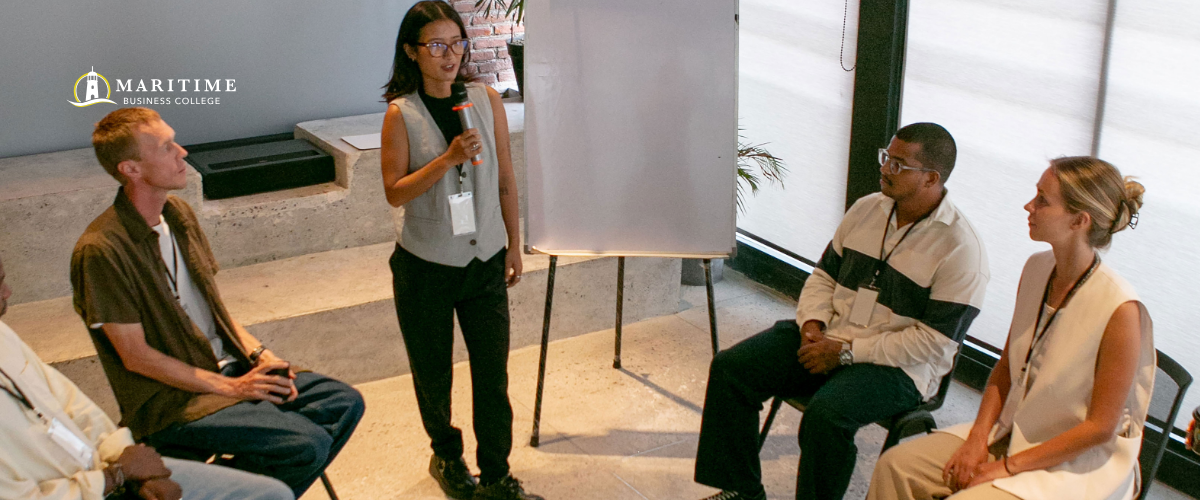Is a Career in Social and Human Services Right for You?
As societies become increasingly concerned with mental health, community well-being, and inclusive care, the demand for skilled professionals in the social and human services sector continues to grow. A career in this field offers a deeply rewarding experience, long-term stability, and exciting opportunities for personal and professional growth.
The following provides information regarding a path to work in the social and human services sector and how Maritime Business College can help you get started.
What Are Social and Human Services Careers?
A career in social and human services is a broad field where different roles work together to support people, families, and communities with life problems. These could include community mental health workers, substance abuse and addiction workers, crisis intervention workers, life skills coaches, group home workers, and workers with young people. Workers provide emotional support to others, act as an advocate on their behalf, and establish links to community resources.
Current Market Demand and Growth
According to recent labour market statistics, the demand for skilled workers in the social and human services sector and support staff in Canada, especially in Nova Scotia, is steadily increasing. This demand stems from the ageing population, growing awareness of mental health issues, and the expansion of community services. According to reports, this will be the decade when competitive pay and job security become the norm in this particular field.
Why choose Social and human services careers?
Social and human services are perfect for those who wish to have hands-on experience in practical change. One gets to work individually, person to person, trying to improve the quality of life and hence bring positivity to society at large. It offers emotional rewards along with community recognition and a lot of growth opportunities.
Social human services and counselling skills course overview
The Counselling Skills/ Social-Human Services Diploma program at Maritime Business College is designed to train students for a career in the human service professions. In doing so, students gain an understanding of the rudiments in a blend of psychology, sociology, counselling ethics, counselling skills, trauma & abuse, and addictions.
Program Facts
Duration: 12 months of coursework + 2 months supervised field placement (Total 14 months)
Starts: Twice per year – March and September
Includes: 280 hours of on-the-job training
Credential: Diploma in Counselling Skills – Social/Human Services

Learning Approach
The program uses a practical, interactive learning model:
- Theory-to-practice teaching through real-world scenarios
- Role-playing to simulate professional environments
- Group discussions and teamwork to build confidence
- Guest speakers with industry insight
- Multimedia tools like videos and slideshows to reinforce lessons
Classroom Hours
Up to 8 hours/day, Monday to Thursday (with Friday hours when necessary)
Career Pathways After Graduation From the Social and human Counselling skills course
Entry-Level Positions after completing the counselling skills course
- Addictions Worker: Supports individuals recovering from substance abuse. Skills: empathy, communication, understanding of addiction. Employers: rehab centres, clinics.
- Community Support Worker: Provide support to individuals with disabilities or mental health needs in community settings.
- Skills: independence coaching, other basic counselling skills, health and safety procedures.
- Mental Health Support Assistant: Works with licensed therapists to support mental health patients. Skills: listening, confidentiality. Employers: hospitals, private practices.
- Crisis Intervention Worker: Provides immediate support during crises. Skills: calm under pressure, quick decision-making. Employers: shelters, hotlines.
- Youth Program Coordinator: Designs and runs youth support initiatives. Skills: creativity, organization. Employers: youth centres, schools.
Advanced Career Opportunities
- Addictions Counsellor: Provide individual and group counselling to those facing substance dependency. Requires additional certification
- Case Manager: Coordinates a wide range of support services. Involves reporting and liaising with agencies.
- Social Services Liaison: Acts as a bridge between the government and clients. Focus on compliance and advocacy.
Salary Expectations and Benefits
Entry-level roles offer competitive starting salaries ranging from CAD 35,000 to $50,000 annually, with increases based on experience and certifications.
International Opportunities
The skills gained from MBC are highly transferable across provinces. Graduates can pursue employment in Nova Scotia and beyond, including urban centres like Halifax and Toronto. Some may also explore pathways to work in countries where Canadian credentials are recognized. Students interested in international opportunities should research work visa requirements and overseas placement partnerships.
Why Choose Maritime Business College for Your Counselling and Social and Human Services Course?

Accreditation and Industry Recognition
MBC instructors are approved by the NS Department of Advanced Education.
Hands-On Training
Real-world practicum and simulation exercises prepare students for immediate employment, as well as an on-the-job training module.
Small Class Sizes
Focused and personalized attention cultivates confidence with well-refined skills.
Flexible Support
The program allows for structured guidance, practical fieldwork, and optional financing plans.
What You’ll Learn: Key Curriculum Areas of Social and Human Services Careers
ADDICTIONS COUNSELLING -354 HOURS: This course equips individuals with essential skills to work in the addictions field. Students gain a deep understanding of addiction theory, counselling methods, and treatment approaches. Topics include addictive substances, symptoms of substance use disorder, behavioural addictions, crisis intervention, and the Twelve Core Functions of the Addictions Counsellor, fostering an open-minded and professional approach.
HUMAN/SOCIAL SERVICES -20 HOURS: Recognizing the importance of working with many people and agencies in the community as a professional, this module will focus on building partnerships with those persons and agencies and knowledge of various acts. Students will gain knowledge of the Child and Family Services Act, Residential Tenancy Act, ESIA Act, and more. It involves gaining an understanding of working with various supports and services within the Social and human services field.
INTRODUCTION TO PSYCHOLOGY -90 HOURS: This module is based on the study of psychology from its inception to modern-day approaches. Students will receive a foundation of key theories and concepts as well as knowledge of various mental disorders and current DSM-5-TR criteria. This includes genetic predisposition, environmental factors (i.e., nature versus nurture), and more. They will also learn about the human brain, stages of brain development, and trauma’s impact on the brain, as well as an understanding of human behaviour and what influences it.
SPECIAL POPULATIONS -80 HOURS: This module focuses on building culturally competent counselling skills through theory and practical application. Students learn to support individuals from diverse backgrounds facing systemic and intergenerational challenges. Topics include marginalized groups, cultural histories, and current experiences. Students gain skills to serve BIPOC, 2SLGBTQIAP++, and various religious and spiritual communities with empathy and awareness.

COUNSELLING ETHICS -100 HOURS: The objective of this module is to provide ethical guidelines, models, and procedures required by governing bodies that regulate private counsellors and the expectations of agencies in the field of social human services. Students will be introduced to several models for ethical decision making and the steps and processes involved in these decisions. Upon completion of this module, the students will demonstrate an understanding of the need for ethical standards as well as how to employ the standards (models, process, etc).
TRAUMA & ABUSE -90 HOURS: This module is very beneficial for students as they prepare for employment in the field of social human services. The range and complexity of clients’ challenges can be vast, and as a professional in this field, organizations will expect you to meet the needs of the populations they serve. Throughout this module, students will explore the complexity of how trauma affects an individual, various sections of the Criminal Code of Canada, local impacts of intimate partner violence, child abuse and neglect, and more. Topics in this module will include cycles of violence, complex grief, supporting survivors, and the healing process.
COUNSELLING APPROACHES & THEORY -100 HOURS: The objective of this module is to provide students with a basic understanding and knowledge of psychological theory. Theories and techniques, as well as problems in individual counseling, will be explored. Topics will include applied skills and techniques, behavioural psychology, rational emotive therapy, and case studies, as well as roleplaying.
COUNSELLING SKILLS LEVEL I -100 HOURS: This module introduces basic counselling skills, focusing on information gathering, attending behaviour, empathy, and effective communication. Students learn to use open/closed questions, reflection, paraphrasing, and summarization. Key topics include the helping model, confidentiality, rapport-building, and counselling goals. By course end, students gain theoretical grounding and begin shaping their personal counselling style.

COMPUTER APPLICATIONS -60 HOURS: A basic module designed to provide the students with an understanding of computer concepts, terminology, hardware, and software. This is a hands-on introduction to computers. Upon completing this portion of the program, students will have acquired the skills and knowledge necessary to effectively utilise computers in their work environment.
COUNSELLING SKILLS LEVEL II -100 HOURS: Level II counselling skills (more than Basic counselling skills course) focus on integrating and critically evaluating counselling techniques. Students learn to provide focus, manage resistance, use confrontation, and offer insight. Emphasis is placed on understanding behavioural change, the phases of counselling, and forming hypotheses for future sessions. Students demonstrate ongoing skill development and effective session planning based on assessments.
MEDICAL AND EMERGENCY PRACTICES -50 HOURS: This module, delivered at key points in the program, trains students to identify and respond to medical and emergency situations, including basic medical and personal client care. Students gain certifications such as Nonviolent Crisis Intervention (NCI), First Aid/CPR, suicide intervention (ASIST), and personal care practices, enhancing their readiness for real-world support roles.
ADMINISTRATION/COMMUNICATION -60 HOURS: During this module, students will be trained in Crisis Management and Training Services, Critical Incident Stress Management (CISM), Diffused Hostility and Bereavement Counselling. They will learn how to communicate effectively during critical and high-stress circumstances.
INDIVIDUAL COUNSELLING PRACTICUM -70 HOURS: In this module, students apply their counselling skills through role-play and simulations, including client intake, discharge, searches, crisis, and suicide intervention. These practical exercises demonstrate their ability to support clients effectively and respond appropriately in emergencies, showcasing the comprehensive knowledge and skills gained throughout the course.
ON-THE-JOB TRAINING -280 HOURS: The on-the-job training is an important component of the program, designed to provide the student with the opportunity to utilise and expand on their classroom training. Students must successfully complete all modules and certifications to qualify for on-the-job training.

Admission Requirements and Application Process for Bright Social and Human Services Career
To qualify, applicants must submit:
- High school transcript or equivalent (or approved assessment)
- Resume
- Two letters of reference
- Letter of intent
- Clear criminal record check
Financial Investment and Support Options
- Canada Student Loan / Provincial Student Loan eligibility
- Flexible payment plans are available
- Student Line of Credit (via banking partners)
Note: On-the-job training begins only after academic and financial requirements are met.
What do our students say who have completed their Social and Human Counselling Skills course?
Graduates are recognised by community partners for their professionalism, readiness, and counselling skills competency. Many alumni go on to work in both government-supported and private sector institutions. Industry professionals regularly note MBC graduates as being “job-ready” and “strong communicators.”
What are the pathways after completing social and human services careers?
Graduates may:
- Pursue advanced certification
- Continue into bachelor ‘s-level counselling or social work programs
- Apply to partner articulation programs (where available)
FAQs about Social and Human Services Careers
-
What jobs can I get with this diploma?
Community support worker, addictions worker, youth outreach, etc.
-
How long is the program?
60 weeks across two academic years
-
Is there a practicum?
Yes—280 hours of on-the-job training
-
Is financial aid available?
Yes—CSL, PSL, and payment plans
-
Can international students apply?
Yes—IELTS required if applicable
-
What skills will I learn?
Counselling techniques, trauma support, ethics, crisis intervention, and more
-
Is this course recognised?
Yes – approved by the Nova Scotia Department of Advanced Education.